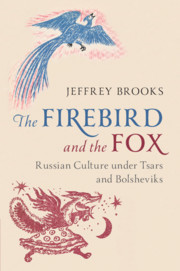Book contents
- Reviews
- The Firebird and the Fox
- The Firebird and the Fox
- Copyright page
- Contents
- Color Plates
- Figures
- Acknowledgments
- Introduction: An Age of Genius
- Part I Emancipation of the Arts (1850–1889)
- 1 Freedom and the Fool
- 2 Desire and Rebellion
- 3 Artists and Subjects
- 4 Anton Chekhov in His Time
- 5 The Writer as Civic Actor
- Part II Politics and the Arts (1890–1916)
- Part III The Bolshevik Revolution and the Arts (1917–1950)
- Epilogue
- Notes
- Index
- Plate Section (PDF Only)
1 - Freedom and the Fool
from Part I - Emancipation of the Arts (1850–1889)
Published online by Cambridge University Press: 05 October 2019
- Reviews
- The Firebird and the Fox
- The Firebird and the Fox
- Copyright page
- Contents
- Color Plates
- Figures
- Acknowledgments
- Introduction: An Age of Genius
- Part I Emancipation of the Arts (1850–1889)
- 1 Freedom and the Fool
- 2 Desire and Rebellion
- 3 Artists and Subjects
- 4 Anton Chekhov in His Time
- 5 The Writer as Civic Actor
- Part II Politics and the Arts (1890–1916)
- Part III The Bolshevik Revolution and the Arts (1917–1950)
- Epilogue
- Notes
- Index
- Plate Section (PDF Only)
Summary
Imperial Russia’s most popular historical novel was not War and Peace but a story of folkloric origins that celebrated freedom and poked fun at authority. The Legend of How a Soldier Saved Peter the Great from Death appeared in multiple versions from 1843 onward and drew upon mythologies of the Fool – in sacred accounts, the Holy Fool (Iurodivyi); in secular tales, little Ivan the Fool (Ivanushka-Durachok). The hero of Russia’s first commercialized folktale, Tsarevich Ivan, the Firebird, and the Grey Wolf, tricks a tsar as the protagonist of the contemporaneous children’s classic, The Little Humpbacked Horse. The freedom of fools was attractive enough in traditional society; amidst multi-dimensional change after the Emancipation, the idea of release from traditional constraint was electrifying. Dostoevsky, Tolstoy and others created a dialogue between the familiar and the new by peopling their works with recognizable characters, foremost among which was the Fool. In so doing they illuminated ideas of self-fulfillment free from oppressive and unjust authority. But the era’s authors and readers also knew that when authority seemed most in shadow, it could return in force. The tension between freedom and order reflected ambivalence toward each that endured in Russian traditions and new works.
Keywords
Information
- Type
- Chapter
- Information
- The Firebird and the FoxRussian Culture under Tsars and Bolsheviks, pp. 19 - 37Publisher: Cambridge University PressPrint publication year: 2019
